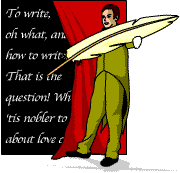Writing Right with Dmitri: The Quantum Moment
Created | Updated Jun 3, 2012
Words, words, words. That's what we're made of. Herewith some of my thoughts on what we're doing with them.
Writing Right with Dmitri: The Quantum Moment

Let's talk speculative.
By 'speculative', I mean stories about stuff that hasn't happened yet. Or that might – or might not – happen. Stuff like life in the future, life on another planet, the result of a new scientific discovery or a new form of human accomplishment. Most of the time, we relegate this sort of thinking to science fiction. Of course, we might also use this kind of device in a horror story – scientist/psychic researcher/other incredibly stupid person commits act of inter-dimensional hubris, gets sixteen tons dumped on her by an outraged cosmos. We might also use it in a non-horror supernatural tale – same person commits less outrageous offence, learns something. At any rate, we speculate: what might happen if X were possible? What might be the range and ramifications of choices?
This sort of plot sets up what we might call a 'quantum moment' – a moment when you're not sure what's going to happen. As the writer and plotmeister, you decide: where does the wave function collapse? Which possibility do you choose? Then you can work out the ramifications.
For something like this to work, the event itself has to be something that hasn't happened yet. It's no good saying, 'The phone rang. Jessica picked up the receiver. Water came out – that's how telephones work, they're 'dial a joke' mechanisms.' Because we know what a telephone does. If the telephone doesn't do what we expect it to do, you've moved the story sideways into a parallel dimension. This is fine, but not what we're talking about.
We don't really know what android robots are going to be like, if they're ever built. We don't know if they will be cooperative bits of machinery, or dangerous egomaniacs. That's why we can still enjoy 2001: A Space Odyssey and Asimov's I, Robot. Those speculations are just as fresh as the day they were written. After all, you don't know for sure HAL couldn't cut the umbilical chord on a hapless spacer.
On the other hand, consider Frankenstein. It is conceivable that readers in the early 19th Century were able to entertain the notion that a doctor could stitch together bits and pieces of old body parts, zap them with electricity from a lightning storm1, and get a grumpy life form out of the process. We cannot, and therefore find Frankenstein rather quaint. We find equally antique the notion that you could go to the moon in a balloon, or by firing yourself from a cannon, etc. Some 'scifi' ideas of the past, though, are so entertaining that we recycle them in the form of fantasy writing. (Think about all those superheroes in comics. We don't really believe that hitting people/spiders/whatever with subatomic particles results in guys in tights who can fly, but, hey, it's so much fun, we just make up a genre for them.)
Your quantum moment may date your story. Take Pierre Boulle's Garden on the Moon, first published in French in 19642. Boulle's novel concerns the race to be the first on the moon – his version has a Japanese suicide mission succeed. Fascinating, but from our retrospective viewpoint, a sort of 'what if?' version.
These leftover quantum moments can take us on a mental journey in which we retrace the steps in our species' thinking about its environment. In the 18th Century, writers thought lightning was full of interesting possibilities. Early writers on mesmerism thought hypnosis might hold the key to the question of life after death:
There was an instant return of the hectic circles on the cheeks; the tongue quivered, or rather rolled violently in the mouth (although the jaws and lips remained rigid as before;) and at length the same hideous voice which I have already described, broke forth:
"For God's sake! – quick! – quick! – put me to sleep – or, quick! – waken me! – quick! – I say to you that I am dead!" – 'The Facts in the Case of M. Valdemar', by Edgar Allan Poe

Personally, I don't know what would happen if a person died while under hypnosis, do you? But we sort of doubt this version. The idea was so persistent that Aleister Crowley used it in his short story 'The Testament of Magdalen Blair'.
The 1960s cult soap opera Dark Shadows persistently used the idea that the I Ching, a form of divination, could be used for time travel. Since nobody's made a functioning time machine that we're aware of, why not? Philip K Dick used the thing for its original purpose, as a deciding device. Neither is fictionally dubious, unless you refuse to speculate at all.
We encounter these quantum moments in modern fiction all the time. Think of the various versions of the original novel FlashForward. Does knowing the future entail determinism, the many-worlds theory, theology? Does it hold out the possibility of immortality? Is this even desirable?
Ask Tithonus, the character in the Greek myth. The myth presupposes the possibility of achieving immortality – without, however, being able to regenerate or renew youth. Poor Tithonus goes from being a handsome young man to. . . well, a cicada. Sad fate. But does anyone remember the episode in Doctor Who in which the Doctor, deprived of his regenerational abilities, ages into something that looks like Peter Jackson made it? He's a sort of sad little gnome with big eyes, in a cage.
What does all this prove? Not much, other than that our imaginations seem to tease out the same strands, over and over. And that we should pick our quantum moments wisely.
Writing Right with Dmitri Archive
